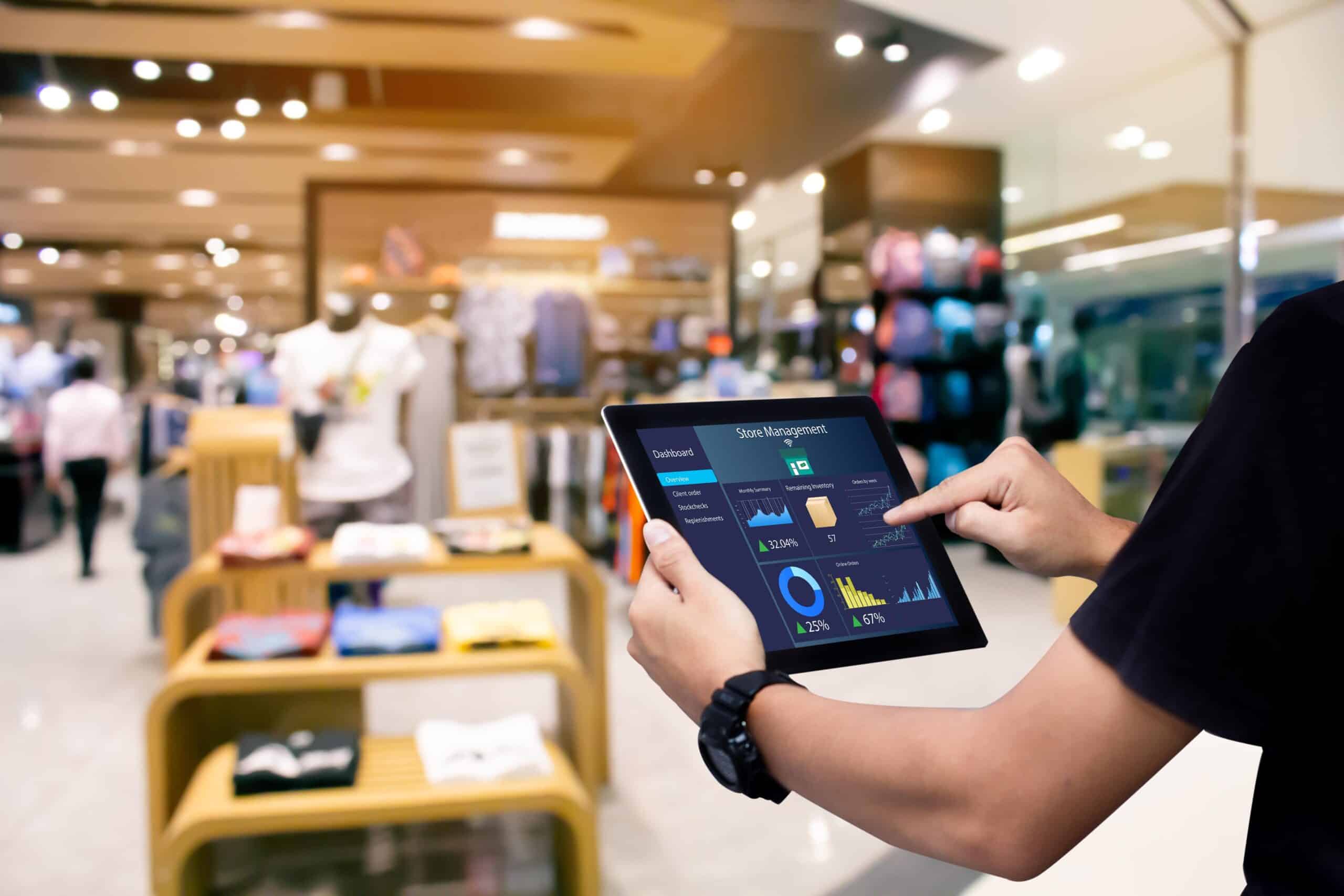- Exploring the benefits of data analytics
- Harnessing the power of platform technologies
- A strong IT infrastructure is key to data processing and cybersecurity
Data is King in today’s world, and its influence is far-reaching, from everyday tasks like planning our commute to the way we shop — and everything in between. The retail sector is undergoing a data revolution that is driving it towards a new era of innovation, efficiency, and ultra-personalisation. This transformation is being fuelled by advanced data analytics and platform technologies that are completely transforming how retailers interact with their customers by creating deeply customised experiences. To provide a seamless and hyper-personalised shopping experience, retailers must leverage technologies like artificial intelligence, analytics, and unified platforms. The successful implementation of these technologies enables retailers to collect, analyse, and use data to understand their customers’ needs and preferences, tailor their products and services to meet their customers’ requirements, and create unique and customised shopping experiences. As retailers embrace the potential of data, they must also navigate the challenges that come with it. They must find ways to ensure customer data is collected ethically and that it is secured against cyber attacks. They must also find innovative ways to integrate new technologies seamlessly with their existing systems, ensuring a frictionless shopping experience for their customers.
The practice of data collection is becoming increasingly extensive and critical, and enables retailers to generate a 360-degree view of their customers.
Exploring the benefits of data analytics in retail
The retail industry is rapidly evolving, and retailers can no longer rely solely on intuition and experience to make informed business decisions. Big data is transforming the way retailers engage with customers and provides a wealth of valuable insights that can help businesses thrive in the highly competitive market. The practice of data collection is becoming increasingly extensive and critical, and enables retailers to generate a 360-degree view of their customers, leading to more precise targeting, better marketing strategies, and increased customer loyalty. Artificial intelligence (AI) is a key tool in data analytics and provides high-quality insights at unprecedented speed. AI-powered analytics can identify major trends, root causes of problems, and similarities between customer experiences. Omnichannel analytics is another approach that allows retailers to gain a 360-degree view of customer purchasing habits. By gathering data from all channels and touchpoints, retailers can create a highly accurate picture of overall marketing performance.
Data is also indispensable in forecasting. It helps retailers anticipate demand and identify trends before they become important. By observing psychological responses and behavioural patterns, analytics can also help optimise online, as well as brick-and-mortar store layouts. This will enable retailers to better match and even forecast their customers’ preferences. However, to achieve these goals, using the latest data platforms is essential, as these can process enormous volumes of data almost instantly. These platforms also support emerging technologies like generative AI by expanding their intelligence with more raw information. As businesses compete to capture market share and customer loyalty, retailers who effectively leverage data insights will retain their competitive edge and ensure their businesses have a place in the world of tomorrow. A data-driven approach enables better-informed business decisions that are based on objective insights rather than intuition alone. Data analytics can reveal important trends and patterns that are invisible to the naked eye and help retailers to optimise their marketing strategies for maximum impact.
Harnessing the power of platform technologies
As we know, in today’s fast-paced world, retailers need to embrace the latest technological advancements in order to stay ahead of the competition. One such advancement that has the potential to transform the retail industry is platform technology. These powerful tools unify a company’s digital technologies, providing a comprehensive solution for creating and executing a coherent data strategy. They allow businesses to streamline their operations, optimise customer touchpoints, and gain a competitive edge in the market. The benefits of platform technology in retail are vast. Firstly, they enable businesses to centralise their data, making it easier to analyse and utilise. By unifying data from various sources, retailers can gain a more holistic view of their customers, improving the accuracy of their marketing strategies and personalised recommendations. Moreover, platform technology simplifies the process of data collection and analysis, making it easier for retailers to identify trends, track customer behaviour, and make data-driven decisions.
Another advantage of platform technology is its ability to streamline various retail operations. From gift card and loyalty programmes to payments and inventory management, platform technology provides a one-stop-shop for retailers to manage all aspects of their business. By integrating these different operations into a single platform, retailers can improve their operational efficiency, reduce costs, and enhance the customer experience. Influencer marketing is another area where platform technology can be incredibly effective. With the rise of social media influencers, retailers have a powerful new marketing tool at their disposal. By partnering with influencers, retailers can reach a broader audience, build brand awareness, and drive sales. Platform technology provides a streamlined solution for managing influencer campaigns, from identifying influencers to tracking performance and ROI. Two examples of platform technology in action are Shopify and Salesforce Commerce Cloud. The all-in-one e-commerce platform Shopify allows retailers to set up an online store, manage their inventory, and process payments. It also provides powerful tools for marketing, including email campaigns, social media integration, and SEO optimisation. Meanwhile, the cloud-based platform Salesforce Commerce Cloud provides a seamless omnichannel shopping experience for customers. It integrates online and offline channels, enabling retailers to provide a personalised and consistent experience across all touchpoints.
With the exponential growth of data points being generated every day, it’s no wonder that the pressure on IT to handle and process this information has become immense.
A strong IT infrastructure is key to data processing and cybersecurity
The Internet of Things (IoT) has revolutionised the way data is collected and used in modern times. With the exponential growth of data points being generated every day, it’s no wonder that the pressure on IT to handle and process this information has become immense. Even the most skilled data scientists are faced with a daunting task if their company’s tech stack doesn’t make optimal use of the latest software tools. Fortunately, a great infrastructure can be the solution to these challenges. An ideal infrastructure can seamlessly integrate the capacity for open data sharing with the power of generative AI such as Chat-GPT to create new efficiencies and innovative outcomes. This can lead to groundbreaking solutions that can transform the retail industry. Additionally, the integration of extended reality technology can unlock even more potential in the handling of data, allowing for the creation of virtual simulations that can be used to solve complex problems in real-world scenarios.
The example of hardware chain Lowe’s creating ‘digital twins’ of some of its stores within the NVIDIA Omniverse Enterprise simulation and collaboration platform is an excellent illustration of the benefits of a good data infrastructure. The creation of virtual versions of physical stores enables employees to test various scenarios related to operations and logistics in a safe and controlled environment, reducing the risk of disruption and potential financial losses. Moreover, the use of VR headsets and the potential implementation of augmented reality X-ray vision could revolutionise the way employees interact with the physical stores, making tasks such as viewing items on higher shelves more efficient and safer. This example highlights the importance of investing in a data infrastructure that can support advanced technologies such as VR, AR, and simulations. Without the necessary infrastructure in place, retail companies will struggle to keep up with the demands of the modern business environment, where the volume and complexity of data continue to increase rapidly.
With the rise of the Internet of Things (IoT) and the collection of vast data points, retailers need to ensure that they have an excellent data infrastructure that can handle the load. One critical aspect of this infrastructure is cybersecurity, as failure to responsibly handle customer (and employee) information can expose retailers to significant financial and reputational damage. This has become even more important as retailers increasingly adopt new technologies, digital assets, biometrics, and self-checkout systems, which can all significantly increase the risk of data breaches. In the last ten years, for instance, retailers have been subjected to more than 10,000 data breaches, most of which were the result of vulnerabilities in their payment infrastructure. Therefore, retailers must optimise their security methods and invest in tools that can help them protect the sensitive data of their customers and employees. This can include network segmentation, data encryption, automated systems, zero trust, and distributed ledgers. By implementing these measures, retailers can ensure that their data infrastructure is protected and that they are meeting the growing demand for data privacy and security.
As we move forward into an increasingly data-driven future, it is clear that retailers that invest in data analytics will be the ones that succeed.
In closing
Data analytics is no longer an optional tool for retailers, but a crucial aspect of their operations. With the rise of the Internet of Things and the collection of data points like never before, the importance of a solid IT infrastructure and cybersecurity cannot be overstated. With the right platform technology in place, retailers can harness the power of data to drive transformative business outcomes, from predictive analytics to hyper-personalised marketing strategies. By investing in personalisation tools and leveraging customer data, retailers can guide customers towards the products they want most, improving their shopping experience and increasing sales. While transitioning to modern analytics methods may be challenging, the results are worth it. Retailers that don’t adopt data analytics run the risk of falling behind their competitors and missing out on valuable insights that can inform every level of their business. In the coming years, we can expect data to become even more indispensable in retail, as businesses seek to gain a deeper understanding of their customers and respond quickly to changes in the market. The future of retail belongs to those who embrace the data revolution and leverage the power of analytics to drive business success. As we move forward into an increasingly data-driven future, it is clear that retailers that invest in data analytics will be the ones that succeed.







